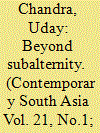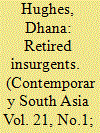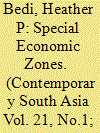|
|
|
Sort Order |
|
|
|
Items / Page
|
|
|
|
|
|
|
| Srl | Item |
| 1 |
ID:
119146


|
|
|
|
|
| Publication |
2013.
|
| Summary/Abstract |
Subalterns, as Ranajit Guha famously argued, resist modern states on the basis of pre-existing social solidarities and an autonomous domain of consciousness. Critics of subaltern studies have argued, however, that subaltern resistance is, in fact, deeply implicated in the symbols and discourses of domination rather than simply constituting an autonomous political domain. Might it be possible to take this criticism of subalternity seriously and yet appreciate the complex ways in which adivasi subjects in contemporary India resist and negotiate their subjecthood? Can we, then, locate resistance in the process of negotiating states? Focusing on the eastern Indian state of Jharkhand, this paper takes up this challenge by probing into the tropes and strategies by which the contradictory mechanisms and meanings of modern state power have been reworked and resisted in two apparently opposed moments of resistance: the 'peaceful' Koel-Karo anti-dam movement of the 1980s and the ongoing 'violent' Maoist movement. In doing so, I show how land and community are intertwined inextricably in recent adivasi resistance such that the notion of 'community' underpins both territorial claims on the post-colonial state by Munda men and women and efforts to remake political selves in dialogue with statist discourses of primitivism.
|
|
|
|
|
|
|
|
|
|
|
|
|
|
|
|
| 2 |
ID:
119143


|
|
|
|
|
| Publication |
2013.
|
| Summary/Abstract |
Few Indian regions evoke political, economic, and cultural marginalisation as much as North-East India. Solutions to its political instability often assume that, provided the vicious circle of under-development and violence can be broken, the region will eventually build a stable relationship with the Indian nation-state. This understanding in turns rests on a long intellectual genealogy that associates development with the state and the nation. By examining development schemes in the North-East Frontier Agency (NEFA, today's Arunachal Pradesh) in the 1950-1960s, a hitherto scarcely administered region where these were the primary mode of state-building, this article cautions against the tendency to see the Indian state's developmental ambitions as an instrument of nation-building. Instead it argues that, in North-East India at least, state-making and nation-building have not historically gone together, and that developmentalism played an important part in this rupture. On the ground, tribal development did little for NEFA's integration into the Indian nation. In fact, state-making processes resulted in the disintegration of the links that had tied NEFA with its regional hinterland in India. In the process, some of the seeds of tensions plaguing today's North-East India were planted.
|
|
|
|
|
|
|
|
|
|
|
|
|
|
|
|
| 3 |
ID:
119142


|
|
|
|
|
| Publication |
2013.
|
| Summary/Abstract |
This article analyzes the construction and operation of the discourse and accompanying practices of entrepreneur development after the Asian tsunami of 26 December 2004 in Sri Lanka. Entrepreneur development formed the core of aid agencies' strategies to rehabilitate livelihoods after the tsunami. Based on a year-long research project in 2005 that included ethnographic and survey components, I analyze the process through which aid agencies converged on entrepreneur development as the answer to livelihoods rehabilitation, an approach that failed to produce a corresponding reduction in poverty and economic insecurity. I also study the reasons why poor people and the rural social movement Sarvodaya embraced this discourse. I argue that while entrepreneurship was perceived by aid groups to be a way out of poverty, poor people and Sarvodaya embraced it because they perceived self-employment as a path out of relations of patronage, and as an opportunity for building self-reliance. These differing rationales generated considerable challenges for Sarvodaya, as they attempted to work with larger aid groups. I conclude that aid agencies do exercise considerable power in the context of disasters, yet their discourses have staying power only in so far as they articulate with other processes shaping people's lives, livelihoods and ambitions.
|
|
|
|
|
|
|
|
|
|
|
|
|
|
|
|
| 4 |
ID:
119147


|
|
|
|
|
| Publication |
2013.
|
| Summary/Abstract |
This article explores the ways in which people who have perpetrated violence reformulate their lives and recreate sociality in the aftermath, through a focus on the narratives of former insurgents in Sri Lanka. It is anchored in a period of violence known as 'the Terror' (Bheeshanaya), which convulsed the southern and central regions of the country in the late 1980s. Attention is paid to how former insurgents go about recreating their social worlds in a post-terror context where 'perpetrators', 'victims', and 'witnesses' must live side-by-side in the absence of justice or reconciliation. This article suggests that for many 'perpetrators' of violence, rebuilding life in the aftermath is grounded in the mundane. The everyday that former insurgents must continually negotiate is saturated with the ethical charge of their past violence, which shapes sociality in the present in convoluted ways. Past violence and its complex moral evaluations linger beneath the everyday and surface unexpectedly under the most banal circumstances. Former insurgents reflexively put in place carefully thought-out strategies to re-create sociality and proactively attempt to manage the obstacles that their violent pasts may throw in the way of their ongoing attempts to reclaim their social worlds after terror.
|
|
|
|
|
|
|
|
|
|
|
|
|
|
|
|
| 5 |
ID:
119145


|
|
|
|
|
| Publication |
2013.
|
| Summary/Abstract |
Acquisition of land and reallocation of previously acquired land for Special Economic Zones (SEZ) has stimulated protests that provide a terrain for exploring the changing landscape of contestation in the liberalizing political economy of India. Social movements, organizations, and communities resist the land, development, and sovereignty implications of SEZs. Although there are common concerns, efforts to co-organize protests on a national or regional scale have proved difficult. In place of nationwide narratives critiquing the model, anti-SEZ resistance predominantly reflects localized interpretations. The parochial nature of resistance to date is a product of diverse opinions on preferred outcomes, regional, or local viewings of the state, particular political dynamics, and the range of actors involved in SEZ struggles. I argue that the state is not a monolithic entity, but rather the anti-SEZ struggles view and make demands upon distinct levels of or individuals within the state. In developing this position, I explore the localization of SEZ struggles in Goa, India, examine the dynamics of resistance at the state level, and address political opportunities that emerge in the context of protest. The state's recent electoral change provides a chance to reflect further on the shifting 'state' target for political protest.
|
|
|
|
|
|
|
|
|
|
|
|
|
|
|
|
|
|
|
|
|